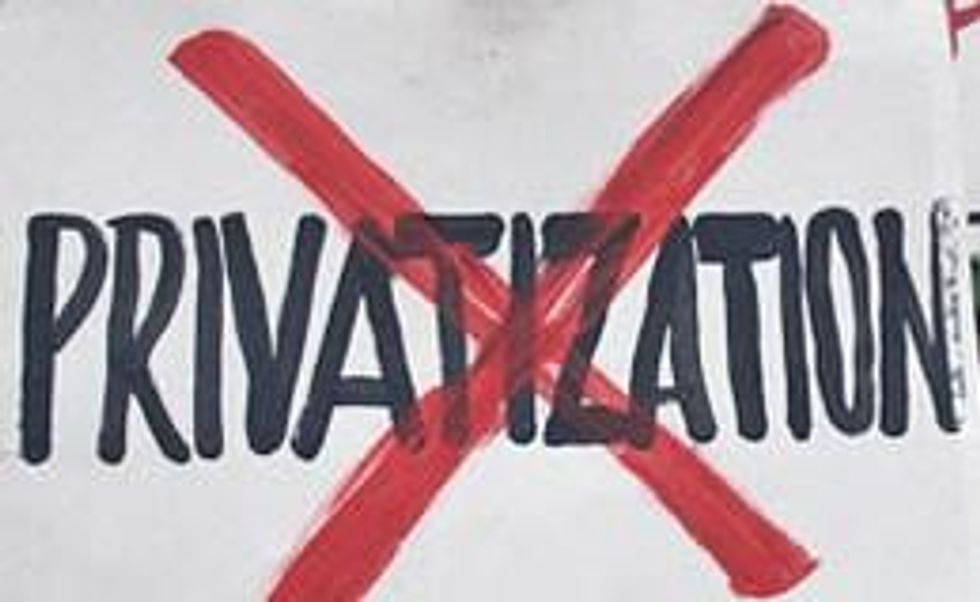Fla. Legislation: More Privatization and Keep It From the Public
Bill would allow more privatization of correctional facilities, revises privatization of agency functions requirements
Privatization was on the agenda today in Florida Senate Rules Committee.
One piece of legislation, SPB 7172, would allow for the privatization of correctional facilities over a large area of southern Florida, while another, SPB 7170, would allow for the secret privatization of some state functions.
The Orlando Sentinel reports:
The Senate Rules Committee, chaired by Sen. John Thrasher, R-St. Augustine, gave the go ahead for the Senate to take up legislation that would privatize correctional facilities in an 18-county South Florida region and also a bill that revises requirements for the privatization process. The second piece of legislation would drop a requirement that departments looking at privatization create a business case for privatization prior to the Legislature making the decision.
Florida Today notes:
The Senate rules committee will take up the bill (PCB 7170) at today's afternoon meeting. The bill essentially means that an agency would not have to report its privatization of a program or service until after the contract is signed.
Open government advocates say the bill would keep the public in the dark about the costs of outsourcing government services. But proponents counter that the measure requires any privatization deal to first offer "a substantial savings" to the state.
An Urgent Message From Our Co-Founder
Dear Common Dreams reader, The U.S. is on a fast track to authoritarianism like nothing I've ever seen. Meanwhile, corporate news outlets are utterly capitulating to Trump, twisting their coverage to avoid drawing his ire while lining up to stuff cash in his pockets. That's why I believe that Common Dreams is doing the best and most consequential reporting that we've ever done. Our small but mighty team is a progressive reporting powerhouse, covering the news every day that the corporate media never will. Our mission has always been simple: To inform. To inspire. And to ignite change for the common good. Now here's the key piece that I want all our readers to understand: None of this would be possible without your financial support. That's not just some fundraising cliche. It's the absolute and literal truth. We don't accept corporate advertising and never will. We don't have a paywall because we don't think people should be blocked from critical news based on their ability to pay. Everything we do is funded by the donations of readers like you. Will you donate now to help power the nonprofit, independent reporting of Common Dreams? Thank you for being a vital member of our community. Together, we can keep independent journalism alive when it’s needed most. - Craig Brown, Co-founder |
Privatization was on the agenda today in Florida Senate Rules Committee.
One piece of legislation, SPB 7172, would allow for the privatization of correctional facilities over a large area of southern Florida, while another, SPB 7170, would allow for the secret privatization of some state functions.
The Orlando Sentinel reports:
The Senate Rules Committee, chaired by Sen. John Thrasher, R-St. Augustine, gave the go ahead for the Senate to take up legislation that would privatize correctional facilities in an 18-county South Florida region and also a bill that revises requirements for the privatization process. The second piece of legislation would drop a requirement that departments looking at privatization create a business case for privatization prior to the Legislature making the decision.
Florida Today notes:
The Senate rules committee will take up the bill (PCB 7170) at today's afternoon meeting. The bill essentially means that an agency would not have to report its privatization of a program or service until after the contract is signed.
Open government advocates say the bill would keep the public in the dark about the costs of outsourcing government services. But proponents counter that the measure requires any privatization deal to first offer "a substantial savings" to the state.
Privatization was on the agenda today in Florida Senate Rules Committee.
One piece of legislation, SPB 7172, would allow for the privatization of correctional facilities over a large area of southern Florida, while another, SPB 7170, would allow for the secret privatization of some state functions.
The Orlando Sentinel reports:
The Senate Rules Committee, chaired by Sen. John Thrasher, R-St. Augustine, gave the go ahead for the Senate to take up legislation that would privatize correctional facilities in an 18-county South Florida region and also a bill that revises requirements for the privatization process. The second piece of legislation would drop a requirement that departments looking at privatization create a business case for privatization prior to the Legislature making the decision.
Florida Today notes:
The Senate rules committee will take up the bill (PCB 7170) at today's afternoon meeting. The bill essentially means that an agency would not have to report its privatization of a program or service until after the contract is signed.
Open government advocates say the bill would keep the public in the dark about the costs of outsourcing government services. But proponents counter that the measure requires any privatization deal to first offer "a substantial savings" to the state.


